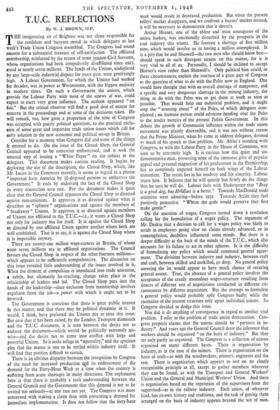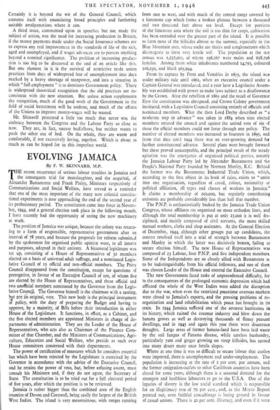T.U.C. REFLECTIONS
By W. J. BROWN, M.P.
THE invigorating air of Brighton was not alone responsible for the confident and buoyant mood in which delegates to last week's Trade Union Congress assembled. The Congress had sound reasons for a substantial measure of self-satisfaction. The affiliated membership, reinforced by the return of some 350,000 Civil Servants, whose organisations had been compulsorily disaffiliated since 1927, stood at nearly seven millions. The funds of the Unions, undepleted by any large-scale industrial dispute for years past, were gratifyingly high. A Labour Government, for which the Unions had worked for decades, was in power at Westminster, with the biggest majority in modern times. On such a Government the unions, which provide the Labour Party with most of the sinews of war, could expect to exert very great influence. The outlook appeared " set fair." But the critical observer will find a good deal of matter for concern in the proceedings and at some of the decisions taken. He will remark, too, how great a proportion of the time of Congress was occupied with purely political questions, to the practical exclu- sion of some great and important trade union issues which call for early solution in the new economic and political set-up in Britain.
Consider for a moment what Congress did and some of the things
it omitted to do. On the issue of the Closed Shop, the General Council appeared to be somewhat embarrassed, and it took the unusual step of issuing a " White Paper " on the subject to the delegates. This document makes curious reading. It begins by deploring the use of the description, the Closed Shop, which, like Mr. Isaacs in the Commons recently, it seems to regard as a phrase " imported from America by ill-disposed persons to embarrass the Government." It ends by endorsing the fact of the Closed Shop in every connection save one. For the document makes it quite clear that the General Council approves the Closed Shop as directed against non-unionists. It approves it as directed against what it describes as " splinter " organisations and against the members of " breakaway " Unions. It approves it as directed against members of Unions not affiliated to the T.U.C.—i.e., it wants a Closed Shop not only for industry but for itself. It is against the Closed Shop as directed by one affiliated Union against another where both are well established. That is to say, it is against the Closed Shop where it is impossible anyway.
There are twenty-one million wage-earners in Britain, of whom
some seven millions are in affiliated organisations. The Council favours the Closed Shop in respect of the other fourteen millions— which appears to be sufficiently comprehensive. The discussion on this issue revealed little understanding of the issues involved in it. When the element of compulsion is introduced into trade unionism, a subtle, but ultimately far-reaching, change takes place in the relationship of leaders and led. The Closed Shop puts into the hands of the leadership—since exclusion from membership involves expulsion from the job—a power with which it ought not to be invested.
The Government is conscious that there is great public interest
in this matter, and that there may be political dynamite in it. It would, I think, have preferred the Unions not to raise this issue. But now that it has been raised, by the London Transport dismissals and the T.U.C. document, it is torn between the desire not to endorse the document—which would be politically extremely un- wise—and the desire not to come into conflict with large and powerful Unions. So it seeks refuge in " neutrality," and the specious plea that the matter is one to be settled within industry itself. It will find that position difficult to sustain.
There is an obvious disparity between the recognition by Congress of the need for increased production azd its endorsement of the demand for the Forty-Hour Week at a time when the country is suffering from acute shortages in many directions. The explanation here is that there is probably a tacit understanding between the General Council and the Government that this demand is not to be treated too seriously—at any rate not yet. The Congress was more concerned with staking a claim than with presenting a demand for immediate implementation. It does not follow that the forty-hour week would result in decreased production. But when the present sellers' market disappears, and we confront a buyers' market instead, it will be necessary to demonstrate that it doesn't.
Arthur Homer, one of the ablest and most courageous of the union leaders, was emotionally disturbed by the prospects in the coal industry this winter. He forecast a shortage of five million tons, which would involve us in having a million unemployed. It is a pity that he and Shinwell—the two men who should know best— should speak in such divergent strains on this matter, for it is very vital to all of us. Personally, I should be inclined to accept Homer's view rather than Shinwell's. Only political bias could, in these circumstances, explain the reaction of a great part of Congress tit the question of what to do with the Poles now in England. One would have thought that with an overall shortage of manpower, and a specific and very dangerous shortage in the mining industry, the thing to do with the Poles was to get them at work as soon as possible. That would help our industrial problem, and it might stop the " strutting about " of the Poles, of which delegates com- plained ; no humane person could advocate handing over the Poles to the tender mercies of the present Polish Government. In this debate the growth of Communist influence within the trade union movement was plainly discernible, and it was not without reason that the Prime Minister, when he came to address delegates, devoted so much of his speech to that problem. Mr. Attlee's standing with Congress, as with the Labour Party in the House of Commons, was seen to be extremely high. It is curious how this quiet and un- demonstrative man, possessing none of the immense gifts of popular appeal and personal magnetism of his predecessor in the Premiership, has so completely imposed himself on both wings of the Labour movement. The secret lies in his modesty and his sincerity. Labour trusts him. It believes that he will quietly but firmly do the things that he says he will do. Labour feels with Shakespeare that "Brag is a good dog, but Holdfast is a better." Towards MacDonald trade unionists were admiring—before 1931. Towards Attlee they feel positively protective. " Whom the gods would preserve they first make gentle."
On the question of wages, Congress turned down a resolution calling for the formulation of a wages policy. The argument of Mr. Deakin that a decision to call for a wages policy was likely to result in employers going slow on claims already advanced, or in contemplation, doubtless influenced some minds. But there is a deeper difficulty at the back of the minds of the T.U.C., which also accounts for its failure to act in other spheres. It is the difficulty of formulating any policy which would command general agree- ment. The divisions between industry and industry, between craft and craft, between skilled and unskilled, go deep. No general policy covering the lot would appear to have much chance of securing general assent. True, the absence of a general policy involves the acceptance of the crazily anomalous wages-structure resulting from dozens of different sets of negotiations conducted in different cir- cumstances by different negotiators. But the attempt to formulate a general policy would probably split Congress badly, while the anomalies of the present structure only upset individual unions. So Congress decided to dodge this issue.
Nor did it do anything of consequence in regard to another vital problem. I refer to the problem of trade union demarcation. Con- gress properly claims that the unions should be " partners in in- dustry." And years ago the General Council drew the inference that workers should be organised " on the basis of industry." But they are only partly so organised. The Congress is a collection of unions organised on many different bases. There is organisation by industry, as in the case of the miners. There is organisation on the basis of craft—as with the woodworkers, printers, engineers and the rest. There is organisation which appears to rest on no clearly recognisable principle at all, except to gather members wherever they can be found, as with the Transport and General Workers' Union and the General and Municipal Workers' Union. And there is organisation based on the separation of the supervisors from the supervised—as in the railway industry. Each union, of whatever kind, has its own history and traditions, and the task of getting them arranged on the basis of industry appears beyond the wit of man. Certainly it is beyond the wit of the General Council, which contents itself with enunciating broad principles and furthering suitable amalgamations where it can.
A third issue, commented upon in speeches but not made the subject of action, was the need for increasing production in Britain, if the money payments made under the Social Insurance schemes are to express any real improvement in the standards of life of the sick, aged and unemployed, and if wages advances are to possess anything beyond a nominal significance. The problem of increasing produc- tion is too big to be discussed at the end of an article like this. But one element in it is the survival of restrictive trade union practices from days of widespread fear of unemployment into days marked by a heavy shortage of manpower, and into a situation in which " full employment " is to dominate Government policy. There is widespread theoretical recognition that the old practices are in- consistent with the new situation. But unless action supplements the recognition, much of the good work of the Government in the field of social betterment will be undone, and much of the efforts of the Unions to improve money-wages will be wasted.
Mr. Shinwell protested a little too much that never was the embrace between the Congress and the Labour Party so close as now. They are, in fact, uneasy bedfellows, but neither wants to push the other out of bed. On the whole, they are warm and comfortable, if not excessively loving, together. Which is about as much as can be hoped for in this imperfect world.



































 Previous page
Previous page